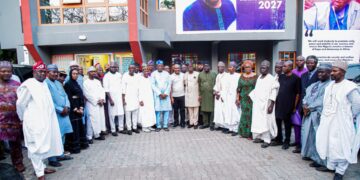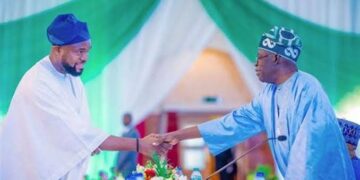The Speaker of the House of Representatives, Hon. Tajudeen Abbas has stated categorically that the Green Chamber has not taken any definite position on the tax reform bills sent to the National Assembly by President Bola Tinubu.
The bills are: the Nigeria Tax Bill, the Nigeria Tax Administration Bill, the Nigeria Revenue Service Establishment Bill, and the Joint Revenue Board Establishment Bill.
TheHintsNews reports that the Northern State Governors’ Forum (NSGF) and Northern Council of Traditional Rulers and Chiefs recently at their joint meeting in Kaduna expressed displeasure on the bills particularly the aspects concerning the derivation-based model for Value Added Tax (VAT) distribution among the country’s federating units.
However, the Chairman of the Presidential Committee on Fiscal Policy and Tax Reforms, Mr. Taiwo Oyedele, clarified that the proposed reform of Tax laws was meant to correct the anomalies in current tax laws, particularly the VAT distribution model.
But, Abbas while declaring open an interactive session on the proposed Bills said the controversies surrounding these bills—whether in the media, civil society, or among governance stakeholders—are a reflection of their importance.
He was of the opinion that such debates are healthy and necessary in a democracy, and this session aims to channel those discussions into productive outcomes.
The Speaker said it is critical to listen to diverse perspectives, ask probing questions, and seek clarity on any unclear provisions.
He noted that the four bills represent critical proposals from the executive to expand Nigeria’s tax base, improve compliance, and establish sustainable revenue streams for our nation’s development.
Abbas explained that the purpose of this session is to provide lawmakers with a comprehensive understanding of the proposed bills.
His words: “It is designed to deepen our appreciation of their provisions, commence constructive dialogue on contentious or controversial areas, and build the consensus necessary to produce versions of the bills that align with the interests of the executive, the legislature, sub-national governments, and the Nigerian people.
“Importantly, this session will help us identify areas needing amendment, clarification, or improvement and consider the compatibility of these bills with the 1999 Constitution (as amended) and other extant laws.
“Yet, Nigeria, despite being Africa’s largest economy, struggles with a tax-to-GDP ratio of just six per cent—far below the global average and the World Bank’s minimum benchmark of 15 percent for sustainable development.
“This is a challenge we must address if we are to reduce our reliance on debt financing, ensure fiscal stability, and secure our future as a nation.”
The Speaker said the proposed tax reform bills aimed to diversify the country’s revenue base, promote equity, and foster an enabling environment for investment and innovation.
He added: “However, as representatives of the people, we must approach these reforms thoughtfully, understanding their potential implications for every segment of society.
“Taxes should be fair, transparent, and justifiable, balancing the need for public revenue with the burdens they impose on individuals and businesses.
“Let me be clear: the House has not yet taken a definitive position on these bills. Our role is to scrutinise them thoroughly, ensuring they align with the best interests of our constituents and the nation at large. We owe this duty to Nigerians.”
The Speaker added pre-legislative scrutiny is a well-established practice in many parliaments worldwide, because it allows lawmakers to thoroughly review proposed legislation, address ambiguities, and ensure alignment with constitutional provisions before formal consideration.














